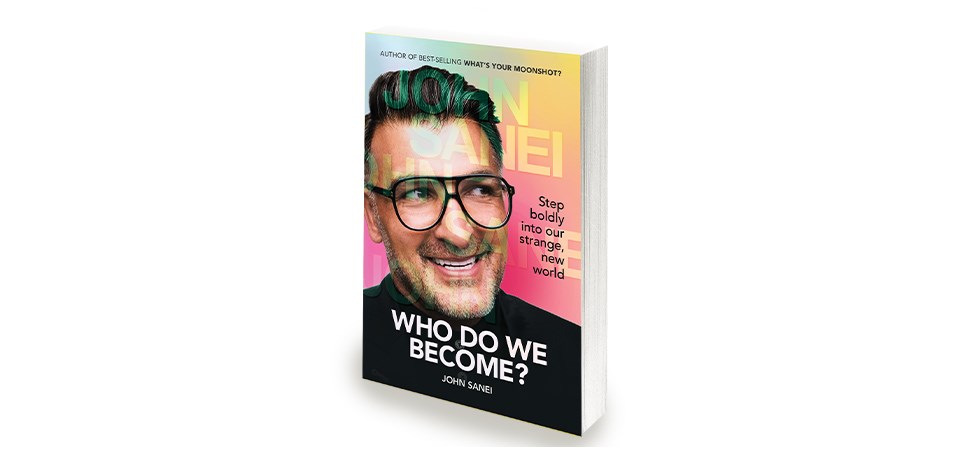
The world is changing rapidly. You don’t need us to tell you this. You know it.
(Plus, everyone else is also saying it – so it’s hardly news.)
What you DON’T know is how to change fast enough to survive in the world that’s waiting for you; how to equip yourself, your children, and your business with skills that won’t become obsolete and techniques that will make you better, faster.
This conundrum is the obsession of John Sanei, futures strategist and author.
On stage at July’s Small Business Showcase dinner at The Tryst, sponsored by Sasfin, John addresses small business owners and business-minded people of all types. He presents the new skills we’ll need to add value to the world ahead of us.
The 3 As
John’s latest book, WHO DO WE BECOME?, describes three stages of experience.
“Humanity is transforming,” says John. Everything we once trusted is unravelling or imploding. “Even governments don’t really work. This happens once every 80 years and the main thing is this: Don’t panic. Just realise this is the stage that we’re in.”
This is ANGUISH, according to John’s philosophy. It’s the first phase, during which we kick and scream. For instance, consider how we mourned and are still mourning the loss of our ‘normal’ pre-Covid world. John’s advice? Make peace with the chaos.
The second phase, ABNORMAL, is characterised by strangeness; a weird new environment that we must process if we hope to get through to the other side. Yes, unlearning is hard. For this reason, John reads everything three times: once to listen to it (encounter it), once to ingest it (take it in), and once to digest it (make it real).
And what’s on the other side? ADVENTURE. A new world, where rebirth and renewal are to be found.
Here’s the kicker. We’re nowhere near ADVENTURE yet. We’re still in between ANGUISH and ABNORMAL, trying to learn the rules of a game without rules.
Think about it, says John. “Most organisations call themselves ‘agile’, but at the same time, they’re addicted to certainty.” Organisations call this addiction ‘ROI’, to make it palatable. But agility and a need for certainty cannot possibly co-exist.
And what happens then? Well, says Unesco, you get ‘poverty in re-imagination’.
History
If we over-simplify the timeline of human endeavour, starting with our forefathers, we move from Agriculture (muscle) to Industry (systems) to Intelligence (learning).
You might say that we’re now in the age of Uniqueness. But we’re not ready for it. Because, in the new world, all the things we’ve spent the last 200 years building and learning have been replaced by tech, so we face a surplus of sameness.
Education makes it worse. Educational institutions have trained hundreds of thousands of people to be the same and as a result, our world is over-supplied with very smart people, all educated in more or less the same ways.
What’s the answer? Individuality. John says, “The passion economy provides an escape route out of sameness, a road towards personal fulfilment and a chance to provide singular, exceptional contributions to the world at large.”
“It’s free.”
Bear in mind, says John, that “everything technology touches becomes free – music, photos, education, entertainment…” He cites Jeremy Rifkin’s The Zero Marginal Cost Society, explaining that every time something is digitised, it becomes free.
Think Whatsapp.
According to Rifkin, energy and transportation are next. After all, says John to raucous laughter, we’re hardly smashing it on either front. Energy? There are catastrophic rolling blackouts in China (and you thought it was just here at home!) and airports in the Global North are, objectively, a disaster.
Solutions are simply not being created by the tools we’re using. New tools are needed and John says these are intuition, creativity and fascination:
“The passion economy is about finding and developing something you really love and profiting from it. [It] places a premium on softer skills such as personality and imagination. The way [it] empowers the individual will change our pre-existing notions of careers, putting an end to the conventional path to university, internship, the corporate ladder. [It’s] is not just about being your own boss; it’s about offering unique content and engaging communities.”
In this new world technology plays the role of the enabler, not the intermediary.
Your business
Because we’ve moved from a complicated world to a complex world, we need to learn to cope in the latter. Patterns no longer repeat. The economies that matter are economies of learning and robustness, not the economies of scale.
On this basis, anti-fragility is the goal. You fall, you get stronger. That’s success!
We must over-prepare – for example, we must have two human pilots, even with autopilot. We must operate with complexity and uncertainty in mind, because if we’re not thinking about what’s coming, we’re not going to be prepared when it does come. And we must celebrate process, effort and challenge, not just the end result.
En route, says John, if you learn nothing else, learn this: Seek discomfort. Seeking comfort puts you back. The age of the comfort zone is over. At least, for now.
Visit the Small Business Showcase for small businesses that do amazing things.